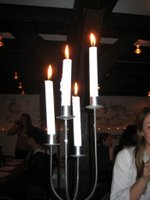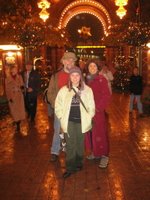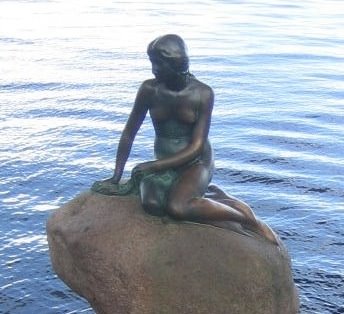I was shocked to learn the other day that most Danes are completely oblivious to the pagan roots of their Christmas celebration. At the DIS Julefrokost there was a quiz competition, and one of the multiple choice questions asked "Why is Christmas celebrated on December 25th?" Answers were along the lines of "That's when Jesus was born," "The Bible says to celebrate then," "That's when Christmas trees are in season," and what was, to me at least the obvious answer, "To compete with a traditional pagan holiday." It didn't help that the Danes at my table were unfamiliar with the word "pagan," which I explained to them as pre-Christian, but when I told them that was the correct answer, they took it as new information. My worldly Danish teacher is well aware of the pagan origins of the Danish "Jul;" she pointed out in class one day that the Danes still use the old name for the holiday, which lacks any direct reference to Christianity, unlike "Christmas." Yet maybe this is part of the reason they are so ignorant of the pagan celebration: Jul=Jesus's birthday—the Christians successfully commandeered the old Nordic solstice festival.

This being said, Danish Protestant Christianity and Danish Jul, in their present forms, must be explained. There is no separation of church and state in Denmark; in fact, to not be a member of the official church, one has to opt-out on one's birth certificate. For this reason, about 98% of Danes are members of the national Christian church, yet only about 2% regularly attend services. Most people do go to church for Christmas and Easter, as a part of tradition, though not all. My host family, for instance, does not; however, my host siblings were confirmed. I really don't understand why Danes bother to get confirmed, because they'll probably never go to church again until their funeral, but they do nonetheless. Despite this, the Danes are a very skeptical people. In a sense, they can't understand the devoutness that limits the ability of some Muslims to integrate. The idea of putting religion first is a foreign concept. I don't know what the general stance is on the existence of God, except that they would say "Jeg tror på Gud," which expresses an opinion or belief that is not based on experience. I think (jeg tror), though, that no one would be presumptuous enough to say ultimately whether there is or isn't a God.

Although Jul may be the one time each year most Danes get themselves to church, and plenty of songs refer to the birth of Jesus, the celebration really has very little to do with Christianity. Tivoli is one such example - I don't know of any greater concentration of holiday decorations and lights. And hidden among the evergreens and nisser (elves) and hearts and lights there actually is a nativity. I was somewhat surprised to stumble upon it the first time I was at Jul i Tivoli, and except for the fact that I went out of my way to point it out to friends on future visits, they never would have seen it. There are such occasional, subtle religious references, but for the most part Jul is a holiday of gløgg and æbleskiver, nisser,

Julemanden (Santa Clause), hearts, flags (and the colors red and white in general), and of course, LIGHTS. The streets and stores of København have been decorated since November, making the city an especially beautiful and happy place after dark. And given that it's pitch black outside by 4 pm, the little pick-me-up given by the sight of the lit-up city is important for mental health. Slowly but surely, as the days get darker, the festivity increases--Tuborg releases their Christmas beer in early November, Tivoli opens a little later, by the end of the month Nyhavn Jul Market is open as well and there's ice skating in Kongens Nytorv, and in early December the Christmas tree in Rådhuspladsen is lit following a grand parade. Holiday festivities and lights run throughout the month of December, with Christmas dinners at every workplace, calendar candles lit every month and advent wreaths lit every Sunday, and packet calendars (Advent calendars)

of little gifts to make waking up easier on dark mornings. These festivities are not about Jesus--they are about getting through the dark time, about making the dark days brighter. The decorations, the celebrations, the lights, they all respond to something innately human, a need older than Christianity, a need older than even the Vikings.

This festive spirit transcend religion. But as Christianity has co-opted it, the question remains, how do the non-Christians, in Denmark the 2% who are sure to opt-out of the state religion, relate to this season? How do they brighten their darkening days? I have heard that Chabad sets up a menorah in Axeltorv, as is their right, though some of the more integrated Jews aren't too happy about it. There are, additionally, though of no religious significance, Stars of David among the decorations about one of the streets downtown. In this country of freedom of speech and religion, it would be impossible, politically, (ludicrous even) to argue that the Christmas spirit is oppressive, and that other holidays deserve equal representation. How then do those who identify as Jewish or Muslim or Hindu relate to this time of year? The darkness is omnipresent, though not something their religious tradition is used to in such extremes. Do they join in the Jul celebrations? I'm sure some do, just as some American Jews have a Christmas tree. Celebrating Hanukkah can easily be incorporated into Danish life, and very discretely—for 8 days, you light some more candles on a certain candlelabra and say a prayer, and maybe you have another or just a shorter pakke-calendar for the kids. But this raises questions about Hanukkah—this festival of lights also falls as days get darker; as I said before, the darkness is not felt as much is Israel as in Denmark, but I have to wonder, did those 8 days really fall around this time of year, or was this time of year connected with the holiday because it was most useful around the solstice? The answers to my questions are probably available from some knowledgable source, but for now I'm happy just to muse.

From a northern hemispheric perspective, I conclude, when it comes down to it we're all still celebrating the solstice, and doing what we can to get through December. Christianity and consumerism have both managed to co-opt the holiday. I think it's time we reclaim and depoliticize Jul. Light candles, eat food, decorate the house with stars and hearts and snowflakes and symbols of life (such as an evergreen tree, perhaps) and whatever you damn well please, even religious symbols if you like. Sing songs, be they about snowmen or Jesus or the sun goddess—it's the spirit that you sing them in that matters most. I think the Hortons have it right when they follow their solstice celebration with Xmas caroling. The one rule should be, whatever your religion or belief system or philosophical inclination, have a good time, be festive, and do what it takes to get you through this darkening time.
 Although Jul may be the one time each year most Danes get themselves to church, and plenty of songs refer to the birth of Jesus, the celebration really has very little to do with Christianity. Tivoli is one such example - I don't know of any greater concentration of holiday decorations and lights. And hidden among the evergreens and nisser (elves) and hearts and lights there actually is a nativity. I was somewhat surprised to stumble upon it the first time I was at Jul i Tivoli, and except for the fact that I went out of my way to point it out to friends on future visits, they never would have seen it. There are such occasional, subtle religious references, but for the most part Jul is a holiday of gløgg and æbleskiver, nisser,
Although Jul may be the one time each year most Danes get themselves to church, and plenty of songs refer to the birth of Jesus, the celebration really has very little to do with Christianity. Tivoli is one such example - I don't know of any greater concentration of holiday decorations and lights. And hidden among the evergreens and nisser (elves) and hearts and lights there actually is a nativity. I was somewhat surprised to stumble upon it the first time I was at Jul i Tivoli, and except for the fact that I went out of my way to point it out to friends on future visits, they never would have seen it. There are such occasional, subtle religious references, but for the most part Jul is a holiday of gløgg and æbleskiver, nisser, Julemanden (Santa Clause), hearts, flags (and the colors red and white in general), and of course, LIGHTS. The streets and stores of København have been decorated since November, making the city an especially beautiful and happy place after dark. And given that it's pitch black outside by 4 pm, the little pick-me-up given by the sight of the lit-up city is important for mental health. Slowly but surely, as the days get darker, the festivity increases--Tuborg releases their Christmas beer in early November, Tivoli opens a little later, by the end of the month Nyhavn Jul Market is open as well and there's ice skating in Kongens Nytorv, and in early December the Christmas tree in Rådhuspladsen is lit following a grand parade. Holiday festivities and lights run throughout the month of December, with Christmas dinners at every workplace, calendar candles lit every month and advent wreaths lit every Sunday, and packet calendars (Advent calendars)
Julemanden (Santa Clause), hearts, flags (and the colors red and white in general), and of course, LIGHTS. The streets and stores of København have been decorated since November, making the city an especially beautiful and happy place after dark. And given that it's pitch black outside by 4 pm, the little pick-me-up given by the sight of the lit-up city is important for mental health. Slowly but surely, as the days get darker, the festivity increases--Tuborg releases their Christmas beer in early November, Tivoli opens a little later, by the end of the month Nyhavn Jul Market is open as well and there's ice skating in Kongens Nytorv, and in early December the Christmas tree in Rådhuspladsen is lit following a grand parade. Holiday festivities and lights run throughout the month of December, with Christmas dinners at every workplace, calendar candles lit every month and advent wreaths lit every Sunday, and packet calendars (Advent calendars) of little gifts to make waking up easier on dark mornings. These festivities are not about Jesus--they are about getting through the dark time, about making the dark days brighter. The decorations, the celebrations, the lights, they all respond to something innately human, a need older than Christianity, a need older than even the Vikings.
of little gifts to make waking up easier on dark mornings. These festivities are not about Jesus--they are about getting through the dark time, about making the dark days brighter. The decorations, the celebrations, the lights, they all respond to something innately human, a need older than Christianity, a need older than even the Vikings. This festive spirit transcend religion. But as Christianity has co-opted it, the question remains, how do the non-Christians, in Denmark the 2% who are sure to opt-out of the state religion, relate to this season? How do they brighten their darkening days? I have heard that Chabad sets up a menorah in Axeltorv, as is their right, though some of the more integrated Jews aren't too happy about it. There are, additionally, though of no religious significance, Stars of David among the decorations about one of the streets downtown. In this country of freedom of speech and religion, it would be impossible, politically, (ludicrous even) to argue that the Christmas spirit is oppressive, and that other holidays deserve equal representation. How then do those who identify as Jewish or Muslim or Hindu relate to this time of year? The darkness is omnipresent, though not something their religious tradition is used to in such extremes. Do they join in the Jul celebrations? I'm sure some do, just as some American Jews have a Christmas tree. Celebrating Hanukkah can easily be incorporated into Danish life, and very discretely—for 8 days, you light some more candles on a certain candlelabra and say a prayer, and maybe you have another or just a shorter pakke-calendar for the kids. But this raises questions about Hanukkah—this festival of lights also falls as days get darker; as I said before, the darkness is not felt as much is Israel as in Denmark, but I have to wonder, did those 8 days really fall around this time of year, or was this time of year connected with the holiday because it was most useful around the solstice? The answers to my questions are probably available from some knowledgable source, but for now I'm happy just to muse.
This festive spirit transcend religion. But as Christianity has co-opted it, the question remains, how do the non-Christians, in Denmark the 2% who are sure to opt-out of the state religion, relate to this season? How do they brighten their darkening days? I have heard that Chabad sets up a menorah in Axeltorv, as is their right, though some of the more integrated Jews aren't too happy about it. There are, additionally, though of no religious significance, Stars of David among the decorations about one of the streets downtown. In this country of freedom of speech and religion, it would be impossible, politically, (ludicrous even) to argue that the Christmas spirit is oppressive, and that other holidays deserve equal representation. How then do those who identify as Jewish or Muslim or Hindu relate to this time of year? The darkness is omnipresent, though not something their religious tradition is used to in such extremes. Do they join in the Jul celebrations? I'm sure some do, just as some American Jews have a Christmas tree. Celebrating Hanukkah can easily be incorporated into Danish life, and very discretely—for 8 days, you light some more candles on a certain candlelabra and say a prayer, and maybe you have another or just a shorter pakke-calendar for the kids. But this raises questions about Hanukkah—this festival of lights also falls as days get darker; as I said before, the darkness is not felt as much is Israel as in Denmark, but I have to wonder, did those 8 days really fall around this time of year, or was this time of year connected with the holiday because it was most useful around the solstice? The answers to my questions are probably available from some knowledgable source, but for now I'm happy just to muse. From a northern hemispheric perspective, I conclude, when it comes down to it we're all still celebrating the solstice, and doing what we can to get through December. Christianity and consumerism have both managed to co-opt the holiday. I think it's time we reclaim and depoliticize Jul. Light candles, eat food, decorate the house with stars and hearts and snowflakes and symbols of life (such as an evergreen tree, perhaps) and whatever you damn well please, even religious symbols if you like. Sing songs, be they about snowmen or Jesus or the sun goddess—it's the spirit that you sing them in that matters most. I think the Hortons have it right when they follow their solstice celebration with Xmas caroling. The one rule should be, whatever your religion or belief system or philosophical inclination, have a good time, be festive, and do what it takes to get you through this darkening time.
From a northern hemispheric perspective, I conclude, when it comes down to it we're all still celebrating the solstice, and doing what we can to get through December. Christianity and consumerism have both managed to co-opt the holiday. I think it's time we reclaim and depoliticize Jul. Light candles, eat food, decorate the house with stars and hearts and snowflakes and symbols of life (such as an evergreen tree, perhaps) and whatever you damn well please, even religious symbols if you like. Sing songs, be they about snowmen or Jesus or the sun goddess—it's the spirit that you sing them in that matters most. I think the Hortons have it right when they follow their solstice celebration with Xmas caroling. The one rule should be, whatever your religion or belief system or philosophical inclination, have a good time, be festive, and do what it takes to get you through this darkening time.

No comments:
Post a Comment